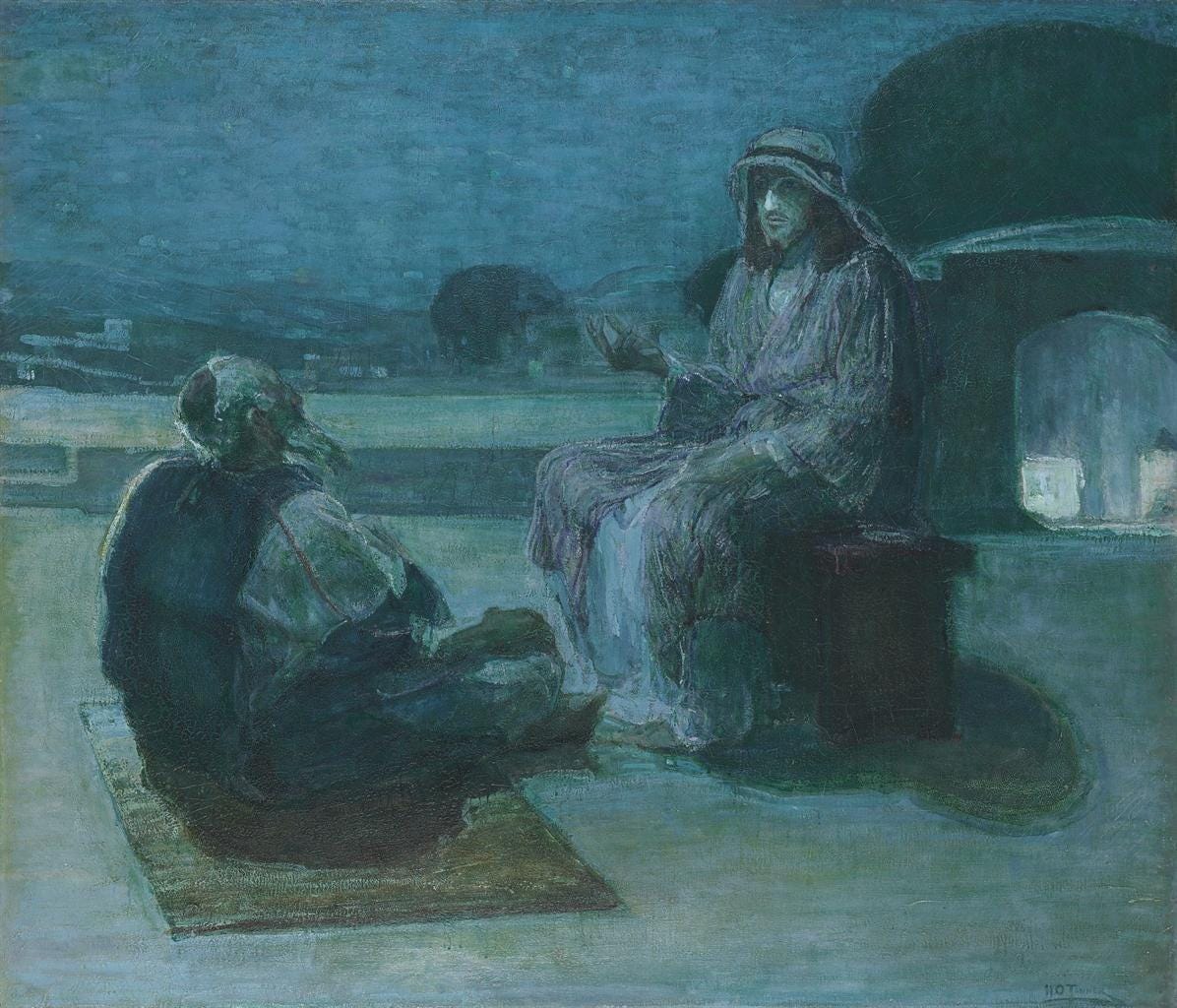Nicodemus and Jesus’s newness of life.
In Jesus’s new economy, “looking to” is synonymous with “believing in.”

In John’s Gospel, one can find perhaps the most oft-quoted and debated scene in all of Christendom, that being the twilight conversation between Jesus himself and Nicodemus, the Pharisee. Nicodemus solicits the Savior at dusk, certainly betraying his consternation in engaging this Galilean miracle worker. This scene, which is unique to John’s Gospel, is ubiquitous mostly as a result of verse 16, where Christ proclaims, “For God loved the world in this way: He gave his one and only Son so that everyone who believes in him will not perish but have eternal life.” But to reduce this exchange to a single seminal verse does this passage a grave disservice.
Nicodemus’s inquiry begins with a partial truth. “We know that you are a teacher,” he says, “who has come from God, for no one could perform these signs you do unless God were with him” (John 3:2). His assertion of Jesus’s authority and aptitude to teach doesn’t go far enough, though. Such is why it is succeeded by Christ’s enigmatic reply: “Truly I tell you, unless someone is born again, he cannot see the kingdom of God” (John 3:3). Nicodemus’s bewilderment belies his standing as a Pharisee and member of the Sanhedrin, the esteemed religious tribunal of the day. Christ’s words should’ve been evocative of key Old Testament passages regarding the salvation that would come through the Messiah. Yet, despite his scholarship, Nicodemus is baffled, responding, “How can anyone be born when he is old?” he wonders. “Can he enter his mother’s womb a second time and be born?” (John 3:4). His reasoning was incarcerated in earthly things whereas the Teacher opposite him was desirous of heavenly things. Such is why it is noteworthy to consider the Old Testament citations with which Christ makes reference.
New birth.
Jesus begins by reorienting Nicodemus’s otherwise wooden comprehension of being “born again” by maintaining that this “new birth” is “of water and the Spirit” (John 3:5–8). It is a profoundly spiritual birth, one that is of the Spirit and from the Spirit. “Whatever is born of the flesh is flesh, and whatever is born of the Spirit is spirit” (John 3:6). Drawing on the prophet Ezekiel’s vision of spiritual restoration and purification in Ezekiel 36—37, Christ means to connect the kingdom of salvation he’s proffering with an eschatology that is altogether divine. “I will also sprinkle clean water on you, and you will be clean . . . I will place my Spirit within you and cause you to follow my statutes” (Ezek. 36:25–27). The association of the “new birth” with his Spirit’s attendance and presence brings added significance to the water and Spirit of the New Covenant.
New blood.
Nicodemus’s continued perplexity over Jesus’s words (John 3:9) leads the Lord to speak further on his establishment of the heavenly kingdom and his proclamation of divine truth. Christ makes the argument that, like anyone else, he is attesting to what he has seen and known. “Truly I tell you, we speak what we know and we testify to what we have seen, but you do not accept our testimony” (John 3:11). The collective disbelief represented by Nicodemus regarding Jesus’s words and works are confronted by Jesus’s own syllogism of divinity, which is suggestive of the prophet Daniel’s vision of the Son of Man “coming on the clouds of heaven” (Dan. 7:13–15). “No one has ascended into heaven except the one who descended from heaven — the Son of Man” (John 3:13). “I am that Man,” he seems to assert. Indeed, he is the “Ancient of Days” come down; Yahweh encased in flesh and blood.
New life.
To conclude, Christ quickly makes one last Old Testament allusion, this time accentuating a narrative with which Nicodemus would surely be familiar. “Just as Moses lifted up the snake in the wilderness,” he declares, “so the Son of Man must be lifted up, so that everyone who believes in him may have eternal life” (John 3:14–15). In a few words, the Lord joins together the simple “look” in order to live, which was promised to the Israelites in Numbers 21, with the simple belief in the blood of the Son of Man, which thoroughly cleanses the sinner (Num. 21:4–9; John 3:18). In Jesus’s new economy, “looking to” is synonymous with “believing in” — and said belief brings with it a bevy of divine outcomes, all of which are of the Spirit.
It is thus that Jesus meant to not only reorient the misguided and misconstrued religiosity of Nicodemus but also to reform our own views of him as well. The “newness of life” in which we walk (Rom. 6:4) as those who have been raised from death “in trespasses and sins” (Eph. 2:1) is something that is initiated and accomplished by the Spirit of the Son of Man, who stands alone as the world’s source for satisfaction, fulfillment, and change.


